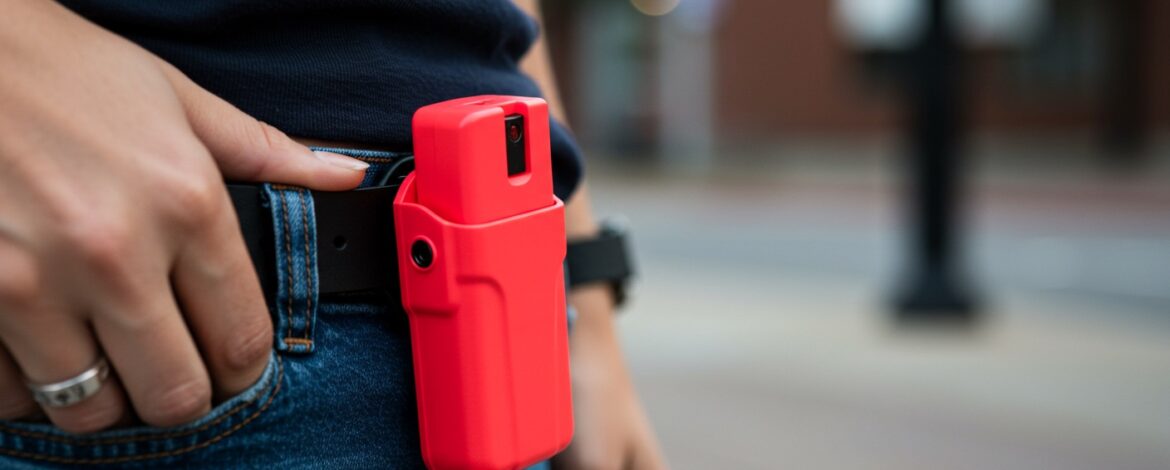Pepper spray has become one of the most popular self-defence tools among South Africans, valued for its effectiveness, affordability, and accessibility. Unlike firearms, pepper spray doesn’t require lengthy licensing procedures or expensive training courses. However, while carrying pepper spray is legal, understanding the nuances of South African law governing its use is essential to avoid serious legal consequences.
No License Required: The Basics of Legal Possession
In South Africa, pepper spray is completely legal to purchase, own, and carry without any permit or license. Unlike tasers and stun guns, pepper spray is not classified as a weapon under the Firearms Control Act. You can buy it from security shops, pharmacies, outdoor stores, and online retailers without providing identification or completing background checks.
This accessibility makes pepper spray an attractive option for personal protection. Prices typically range from R60 to R180, with premium brands like SABRE offering more reliable performance. The lack of bureaucratic barriers means you can arm yourself with a defensive tool immediately, without waiting months for licensing approvals.
However, legal possession doesn’t mean unrestricted use. The Dangerous Weapons Act doesn’t specifically regulate pepper spray, but it does criminalize possession of any object capable of causing serious bodily harm when carried with unlawful intent. This context-sensitive approach means that while pepper spray itself isn’t illegal, how and why you carry it matters.
When Use Becomes Illegal: Understanding the Boundaries
The critical distinction lies between lawful possession and lawful use. You can carry pepper spray anywhere, but using it inappropriately will result in criminal charges. If you spray someone who doesn’t pose an immediate threat to you or others, you’ll almost certainly face assault charges and potential civil liability for medical damages.
South African self-defence law requires that any force used must be necessary, proportionate, and directed at an immediate threat. The attack must have commenced or be imminently threatening. You cannot use pepper spray in retaliation after a threat has passed, or preemptively against someone you suspect might attack you later.
For example, spraying an aggressive person who is verbally threatening you but hasn’t made any physical move would likely be deemed excessive. However, if that same person charges toward you with clenched fists or brandishes a weapon, pepper spray becomes a proportionate response. The threat must be immediate and the force necessary to protect yourself.
Proportionality and Pepper Spray’s Advantages
One of pepper spray’s greatest legal advantages is that it’s inherently proportionate to most threats South Africans face. Unlike firearms, which can only be justified against life-threatening attacks, pepper spray sits comfortably in the middle of the force continuum. Courts are far more likely to accept pepper spray as reasonable force during robberies, assaults, or harassment than they would lethal weapons.
This proportionality principle makes pepper spray ideal for scenarios where deadly force would be excessive. Someone attempting to steal your phone doesn’t justify shooting them, but pepper spray would be completely appropriate. The temporary nature of pepper spray’s effects—blindness, pain, breathing difficulty, and disorientation lasting 45 minutes to several hours—means you’re not inflicting permanent harm while still effectively stopping an attacker.
That said, excessive use of pepper spray can still result in criminal liability. Repeatedly spraying an incapacitated attacker or using it maliciously against someone who has retreated would exceed lawful self-defence boundaries.
Special Considerations and Storage
While no license is required, responsible ownership demands proper storage and handling. Pepper spray can cause death in children through respiratory arrest following accidental exposure. If you have children at home and cannot guarantee secure storage away from their reach, reconsider carrying pepper spray or invest in a locked container.
Quality matters significantly. Many cheap, no-name brands have high failure rates that could leave you defenceless in a critical moment. Invest in reputable brands with proven track records. Check expiration dates regularly, as most pepper spray has a shelf life of approximately two years.
The Dangerous Weapons Bill, clarified by former Police Minister Nathi Mthethwa, explicitly does not seek to restrict pepper spray possession. Despite periodic concerns about legislative changes, pepper spray remains one of the most legally accessible self-defence tools available to South Africans.
Practical Advice for EDC Users
For everyday carry, pepper spray offers an excellent balance between effectiveness and legal protection. Keep it readily accessible—in a pocket, bag, or holster—but secure enough that it won’t accidentally discharge. Familiarize yourself with your specific model’s operation, spray pattern, and range before you need it in an emergency.
Remember that claiming self-defence requires proving your actions met all legal requirements after the fact. If you use pepper spray, document the incident thoroughly, seek witnesses if possible, and consult legal counsel immediately. Understanding these boundaries before a crisis occurs gives you the best chance of both protecting yourself and avoiding prosecution.
Pepper spray remains one of South Africa’s most practical and legally sound self-defence options, provided you respect the legal boundaries governing its use.

